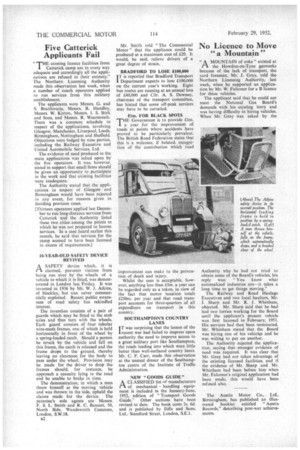Five Catterick Applicants Fail
Page 36

If you've noticed an error in this article please click here to report it so we can fix it.
" THE existing licence facilities from
Catterick camp are in every way adequate and accordingly all the applications are refused in their entirety." The Northern Licensing Authority made this observation last week, when a number of coach operators applied to run services from this military establishment.
The applicants were Messrs. G. and S. Braithwaite, Messrs. R. Handley, Messrs. W. Kirton, Messrs. J. S. Stirk and Sons, and Messrs. R. Wearmouth. There was a common schedule in respect of the applications, involving Glasgow, Manchester, Liverpool, Leeds, Birmingham, Nottingham and Sheffield. Objections were lodged by nine parties, including the Railway Executive and United Automobile Services, Ltd.
The evidence of need produced in the main applications was relied upon by the five operators. It was, however, stated in support that small firms should be given an opportunity to participate in the work and that existing facilities were inadequate.
The Authority stated that the applications in respect of Glasgow and Birmingham would have been rejected in any event, for reasons given in deciding previous cases.
[Thirteen operators applied last December to run long-distance services from Catterick and the Authority listed these two cities-among the points to which he was not prepared to license services. In a case heard earlier this month, he said that services for the camp seemed to have been licensed in excess of requirements.] 16-YEAR-OLD SAFETY DEVICE REVIVED
6, SAFETY device which, it is 1
claimed, prevents victims from being run over by the wheels of a vehicle to which it is fitted, was demonstrated in London last Friday. It was invented in 1936 by Mr. W. J. Atkins, of Hockley, but was never commercially exploited. Recent public awareness of road safety has rekindled interest.
The invention consists of a pair of guards which may be fitted to the stub axles and thus turn with the wheels. Each guard consists of four tubular wire-mesh frames, one of which is held horizontally in front of the wheel by a spring-loaded catch. Should a person be struck by the vehicle and fall on this frame, the catch is released and the frame drops to the ground, thereby leaving no clearance for the body to pass under the wheel. Provision may be made for the driver to drop the frames should, for instance, he approach a casualty lying in the road and be unable to brake in time.
The demonstration, in which a man threw himself at the moving vehicle and was thrown to the side, upheld the claims made for the device. The patentee's sole agents are Messrs. F. S. L. Smith and R. C. Bennett, 50, North Side, Wandsworth Common, London, S.W.18.
B2 Mr. Smith told "The Commercial Motor" that the appliance could be produced at a maximum cost of £20. It would, he said, relieve drivers of a great degree of strain.
BRADFORD TO LOSE E100,000
1Tis reported that Bradford Transport Department expects to lose £100,000 on the current year's working. Eight bus routes are running at an annual loss of £40,000 and Cllr. A. S. Downey, chairman of the transport committee, has hinted that some off-peak services may have to be curtailed.
Elm. FOR BLACK SPOTS
THE Government is to provide £1m. a year for the improvement of roads at points where accidents have proved to be particularly prevalent. The British Road Federation states that this is a welcome, if belated, recognition of the contribution which road
improvement can make to the prevention of death and injury.
Whilst the sum is acceptable, however, anything less than i5m. a year can be regarded only as a token, in view of the fact that motor taxation totals £250m. per year and that road transport accounts for three-quarters of all expenditure on transport in this country.
SOUTHAMPTON'S COUNTRY LANES IT was surprising that the lesson of the 1 recent war had failed to impress upon authority the need to improve access to a great military port like Southampton, the roads leading into which were little better than well-surfaced country lanes. Mr. C. F. Carr, made this observation at the annual dinner of the Southampton centre of the Institute of Traffic Administration.
NEW "GOODS GUIDE" ACLASSIFIED list of manufacturers of mechanical handling equipment is included in the January-June, 1952, edition of "Transport Goods Guide." Other sections have been revised to date. The book costs 2s. 6d. and is published by Iliffe and Sons, Ltd., Stamford Street, London, S.E.1.




















































































